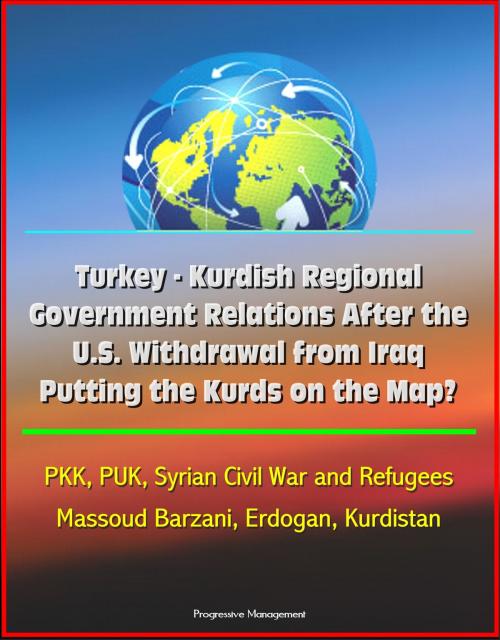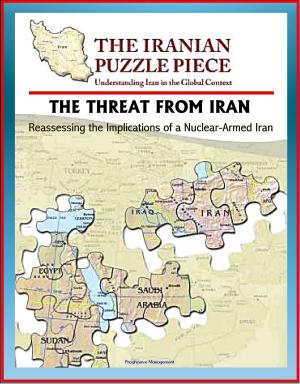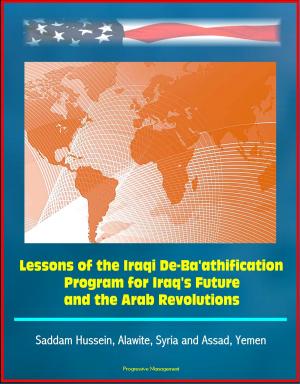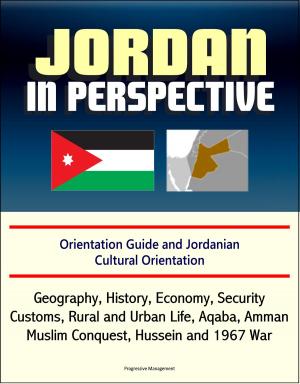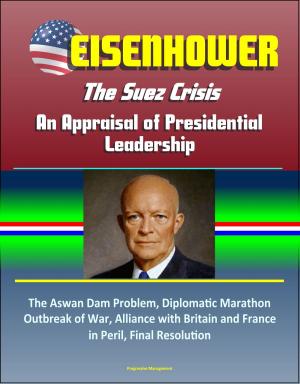Turkey: Kurdish Regional Government Relations After the U.S. Withdrawal from Iraq: Putting the Kurds on the Map? PKK, PUK, Syrian Civil War and Refugees, Massoud Barzani, Erdogan, Kurdistan
Nonfiction, History, Military| Author: | Progressive Management | ISBN: | 9781310299162 |
| Publisher: | Progressive Management | Publication: | April 28, 2014 |
| Imprint: | Smashwords Edition | Language: | English |
| Author: | Progressive Management |
| ISBN: | 9781310299162 |
| Publisher: | Progressive Management |
| Publication: | April 28, 2014 |
| Imprint: | Smashwords Edition |
| Language: | English |
The withdrawal of U.S. combat forces from Iraq at the end of 2011 left behind a set of unresolved problems in the relationship between the Kurdistan Regional Government (KRG), and the Federal Government in Baghdad—notably relating to the disputed boundaries of the KRG, and the extent of its autonomy. Tensions have since been compounded by the discovery of significant quantities of oil and gas in the KRG area, and Erbil's pursuit of an energy policy independent of and in opposition to Baghdad. Turkey, uneasy with the increasingly sectarian and authoritarian flavor of the Shia-dominated government in Baghdad, has since moved closer to the KRG, not least with respect to energy issues. This has deepened Turkish-Iraqi tensions still further.
Added to the mix is the increasingly sectarian stand-off in the region as a whole, in large measure as a consequence of Syrian developments, which has further pitted Ankara against Baghdad and its ally, Iran; and the emergence of a bid for autonomy by Syria's Kurds, which has complicated the stance of both Ankara and Erbil towards Syria and towards each other. Washington is in danger of being left behind by the fast-paced events in the region, while the ethnic Kurds of the region may be approaching a decisive moment in their long struggle for self-determination.
This monograph seeks to explore the ramifications of these developments, both for the region and for U.S. policy and interests. Turkey is a North Atlantic Treaty Organization (NATO) ally, Iraq is a legacy of U.S. policy, and Washington was, in many ways, the midwife for the KRG's initial emergence and subsequent growth. Furthermore, U.S. energy companies are now centrally involved in the evolution of the region and its relationships. Thus, the United States cannot remain indifferent to the march of events in and around Iraq and, whether it likes it or not, will be held at least partly responsible for the outcome. While this monograph makes a contribution to the ongoing debate about the legacy of the past U.S. approach to Iraq, it also performs the valuable service of bringing up to date developments in the region subsequent to the U.S. military withdrawal. To that end, the monograph throws the recent Syrian uprising into the mix. This has intensified sectarian divisions in the Middle East, further pitted Ankara against Baghdad, and additionally raised the specter of the Kurdish question. It has also brought about the deployment of NATO Patriot anti-air batteries into Turkey's southeast, and thrown an additional spotlight on Washington's relationship with its NATO ally, Turkey.
Syria's Kurds are currently seeking to carve an autonomous zone out of that country's chaos, which has aroused the interest of Iraq's Kurds and is profoundly worrying the Turks. Ankara fears that a Syrian Kurdish zone could serve as a refuge and base for the Kurdish Workers Party (PKK), weaken the opposition to Assad, complicate any post-Assad settlement in Syria, and altogether make it harder to keep a lid on its own Kurdish problem. Indeed, Ankara's latest effort to resolve its domestic Kurdish difficulties is surely linked to events in neighboring Syria and Iraq. Thus, this monograph is also a study of the geopolitical ramifications of a Kurdish bid for self-determination, and offers insight into the current struggle in Syria. This timely monograph addresses a plethora of issues that are vital to a range of U.S. interests, and to the debate over the legacy and purposes of U.S. policy.
The withdrawal of U.S. combat forces from Iraq at the end of 2011 left behind a set of unresolved problems in the relationship between the Kurdistan Regional Government (KRG), and the Federal Government in Baghdad—notably relating to the disputed boundaries of the KRG, and the extent of its autonomy. Tensions have since been compounded by the discovery of significant quantities of oil and gas in the KRG area, and Erbil's pursuit of an energy policy independent of and in opposition to Baghdad. Turkey, uneasy with the increasingly sectarian and authoritarian flavor of the Shia-dominated government in Baghdad, has since moved closer to the KRG, not least with respect to energy issues. This has deepened Turkish-Iraqi tensions still further.
Added to the mix is the increasingly sectarian stand-off in the region as a whole, in large measure as a consequence of Syrian developments, which has further pitted Ankara against Baghdad and its ally, Iran; and the emergence of a bid for autonomy by Syria's Kurds, which has complicated the stance of both Ankara and Erbil towards Syria and towards each other. Washington is in danger of being left behind by the fast-paced events in the region, while the ethnic Kurds of the region may be approaching a decisive moment in their long struggle for self-determination.
This monograph seeks to explore the ramifications of these developments, both for the region and for U.S. policy and interests. Turkey is a North Atlantic Treaty Organization (NATO) ally, Iraq is a legacy of U.S. policy, and Washington was, in many ways, the midwife for the KRG's initial emergence and subsequent growth. Furthermore, U.S. energy companies are now centrally involved in the evolution of the region and its relationships. Thus, the United States cannot remain indifferent to the march of events in and around Iraq and, whether it likes it or not, will be held at least partly responsible for the outcome. While this monograph makes a contribution to the ongoing debate about the legacy of the past U.S. approach to Iraq, it also performs the valuable service of bringing up to date developments in the region subsequent to the U.S. military withdrawal. To that end, the monograph throws the recent Syrian uprising into the mix. This has intensified sectarian divisions in the Middle East, further pitted Ankara against Baghdad, and additionally raised the specter of the Kurdish question. It has also brought about the deployment of NATO Patriot anti-air batteries into Turkey's southeast, and thrown an additional spotlight on Washington's relationship with its NATO ally, Turkey.
Syria's Kurds are currently seeking to carve an autonomous zone out of that country's chaos, which has aroused the interest of Iraq's Kurds and is profoundly worrying the Turks. Ankara fears that a Syrian Kurdish zone could serve as a refuge and base for the Kurdish Workers Party (PKK), weaken the opposition to Assad, complicate any post-Assad settlement in Syria, and altogether make it harder to keep a lid on its own Kurdish problem. Indeed, Ankara's latest effort to resolve its domestic Kurdish difficulties is surely linked to events in neighboring Syria and Iraq. Thus, this monograph is also a study of the geopolitical ramifications of a Kurdish bid for self-determination, and offers insight into the current struggle in Syria. This timely monograph addresses a plethora of issues that are vital to a range of U.S. interests, and to the debate over the legacy and purposes of U.S. policy.
